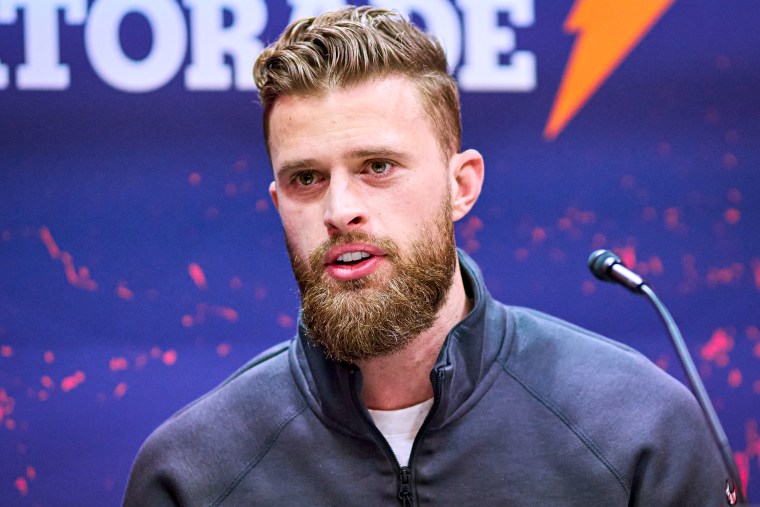
In a turn of events that has left fans and industry insiders buzzing, Eddie Vedder, the iconic frontman of Pearl Jam, experienced a dramatic fallout during what was supposed to be one of the band’s biggest concerts. The turmoil began after Vedder made controversial remarks about Harrison Butker, the Kansas City Chiefs kicker who was recently nominated for the Nobel Peace Prize.
Vedder, known for his powerful voice and passionate performances, has never shied away from expressing his views on social and political issues. However, his comments about Butker struck a particularly discordant note. During a recent concert, Vedder criticized Butker’s outspoken stance on traditional values and freedom of speech, questioning the sincerity and impact of the athlete’s activism.
The reaction from the audience was immediate and intense. What began as a routine interaction with the crowd quickly escalated into a situation that no one had anticipated. Fans, many of whom support Butker’s advocacy and admire his courage, responded with a mix of boos and chants, expressing their displeasure. Social media platforms were soon flooded with reactions, and the hashtag #StandWithButker began trending, amplifying the public’s support for the NFL star.

Vedder’s remarks came on the heels of Butker’s nomination for the Nobel Peace Prize, following his historic speech advocating for unity and freedom of speech. Butker’s message had resonated globally, earning him a wave of support and recognition. For many, Vedder’s criticism seemed ill-timed and out of touch with the broader public sentiment that had been galvanized by Butker’s powerful words.
The fallout from Vedder’s comments had immediate repercussions. Pearl Jam’s concert, which was poised to be a highlight of their tour, saw a significant number of attendees leave the venue in protest. The atmosphere, once electric with anticipation, turned tense and somber. Vedder, sensing the shift, attempted to salvage the performance, but the damage had been done. The concert, meant to be a celebration of music and unity, ended on a discordant note.
Industry analysts suggest that this incident could have lasting effects on Vedder’s career and Pearl Jam’s public image. While the band has a loyal fan base, the backlash from this event underscores the delicate balance artists must maintain when addressing controversial topics. The swift and public support for Butker highlights the growing influence of athletes as social and political figures, capable of mobilizing public opinion in significant ways.
In the days following the concert, Vedder issued a statement seeking to clarify his remarks. He emphasized his respect for Butker’s achievements but reiterated his belief in the importance of critical discourse. Despite this, the public’s reaction remained largely unsympathetic, with many viewing the statement as too little, too late.
Harrison Butker, for his part, responded with grace. In a social media post, he expressed his admiration for Vedder’s musical talents and called for unity and understanding. “We may not always agree,” Butker wrote, “but it’s through respectful dialogue that we can find common ground and move forward together.”
As the dust settles, the incident serves as a reminder of the powerful intersection between sports, music, and activism. It illustrates the complexities and challenges faced by public figures who choose to speak out on important issues. For Eddie Vedder and Pearl Jam, this episode is a stark lesson in the potential consequences of public commentary in a world where every word can have significant ripple effects.
In conclusion, the fallout from Eddie Vedder’s remarks about Harrison Butker has not only impacted a major Pearl Jam concert but also highlighted the significant influence and responsibility of public figures. As the conversation around freedom of speech and activism continues to evolve, this incident stands as a poignant example of the need for thoughtful and respectful discourse in the public arena.

